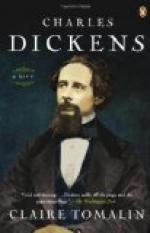Even here, however, I am anticipating; for before getting to 1860 there is in Dickens’ history a page which one would willingly turn over, if that were possible, in silence and sadness. But it is not possible. No account of his life would be complete, and what is of more importance, true, if it made no mention of his relations with his wife.
For some time before 1858 Dickens had been in an over-excited, nervous, morbid state. During earlier manhood his animal spirits and fresh energy had been superb. Now, as the years advanced, and especially at this particular time, the energy was the same; but it was accompanied by something of feverishness and disease. He could not be quiet. In the autumn of 1857 he wrote to Forster, “I have now no relief but in action. I am become incapable of rest. I am quite confident I should rust, break, and die if I spared myself. Much better to die doing.” And again, a little later, “If I couldn’t walk fast and far, I should just explode and perish.” It was the foreshadowing of such utterances as these, and the constant wanderings to and fro for readings and theatricals and what not, that led Harriet Martineau, who had known and greatly liked Dickens, to say after perusing the second volume of his life, “I am much struck by his hysterical restlessness. It must have been terribly wearing to his wife.” On the other hand, there can be no manner of doubt that his wife wore him. “Why is it,” he had said to Forster in one of the letters from which I have just quoted, “that, as with poor David (Copperfield), a sense comes always crushing on me now, when I fall into low spirits, as of one happiness I have missed in life, and one friend and companion I have never made?” And again: “I find that the skeleton in my domestic closet is becoming a pretty big one.” Then come even sadder confidences: “Poor Catherine and I are not made for each other, and there is no help for it. It is not only that she makes me uneasy and unhappy, but that I make her so too, and much more so. She is exactly what you know in the way of being amiable and complying; but we are strangely ill-assorted for the bond there is between us.... Her temperament will not go with mine.” And at last, in March, 1858, two months before the end: “It is not with me a matter of will, or trial, or sufferance, or good humour, or making the best of it, or making the worst of it, any longer. It is all despairingly over.” So, after living together for twenty years, these two went their several ways in May, 1858. Dickens allowed to his wife an income of L600 a year, and the eldest son went to live with her. The other children and their aunt, Miss Hogarth, remained with Dickens himself.
Scandal has not only a poisonous, but a busy tongue, and when a well-known public man and his wife agree to live apart, the beldame seldom neglects to give her special version of the affair. So it happened here. Some miserable rumour was whispered about to the detriment of Dickens’ morals. He was at the time, as we have seen, in an utterly morbid, excited state, sore doubtless with himself, and altogether out of mental condition, and the lie stung him almost to madness. He published an article branding it as it deserved in the number of Household Words for the 12th of June, 1858.




